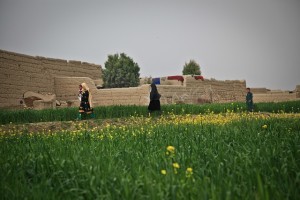The strongest aid organizations are those that do not just provide band aids for a problem, but instead give individuals the tools they need to fix the problem and address it more effectively in the future. Many aid organizations in Afghanistan, such as ACTED, take a holistic approach to development and offer people the knowledge they need to continue economic and social growth, even if the organization ceases to exist. Another major philanthropic organization that takes this approach is Afghanaid, which collaborates closely with Afghan people to increase opportunity and create the foundation for sustainable future development. A British organization, Afghanaid works only in Afghanistan and has overseen local projects there since its inception in 1983.
A Focus on Rural Communities
Afghanaid works primarily with rural communities through programs that empower people economically and socially. Over the years, the organization has launched a number of initiatives and consistently refines its programs to meet the changing needs of the populations it serves. At present, the organization focuses on three primary programs that foster sustainable development. One of the primary issues for Afghanaid remains the provision of basic services, like roads and schools, which are necessary for economic and social development. The organization has helped build wells, sanitation facilities, and irrigation systems as well. Understanding the importance of renewable energy sources for the country, Afghanaid has also assisted in the construction of hydroelectric power systems.
 Another major focus of Afghanaid is emergency assistance and risk mitigation in the event of natural disasters. Afghanistan is especially prone to floods, earthquakes, and droughts, which can cause great suffering and result in severe economic depression. However, with proper preparation, communities can more quickly recover and return to normalcy after a crisis. Afghanaid works closely with government entities and other organizations to supplement existing relief programs. Through its own Food and Livelihoods Response initiative, the organization provides immediate relief, then works to identify long-term needs and creates plans to fulfill them.
Another major focus of Afghanaid is emergency assistance and risk mitigation in the event of natural disasters. Afghanistan is especially prone to floods, earthquakes, and droughts, which can cause great suffering and result in severe economic depression. However, with proper preparation, communities can more quickly recover and return to normalcy after a crisis. Afghanaid works closely with government entities and other organizations to supplement existing relief programs. Through its own Food and Livelihoods Response initiative, the organization provides immediate relief, then works to identify long-term needs and creates plans to fulfill them.
The third main Afghanaid program deals with health and food security. The organization’s representatives work with local farmers to improve their skills in growing and harvesting various crops that are widely cultivated in the country. Through the program, thousands of farmers have increased their yields, which both boosts their income and provides communities with a steady supply of fresh food. For example, Afghanaid launched a project in Ghor province in which it introduced new varieties of wheat and vegetables, provided technical training to more than 1,500 farmers, and helped families plant more than 2,400 kitchen gardens for their personal use. Outside of assistance with growing crops, the organization has provided immunizations and inoculations for livestock to help farmers protect these valuable assets. Understanding the entrepreneurial nature of farming, the organization also offers business training to help individuals develop their farms into thriving small businesses. This assistance allows families to manage their income and remain self-sufficient throughout the year.
Afghanaid’s Three Themes of Sustainable Development
The professionals at Afghanaid have identified three core themes that underpin the sustainable development work they undertake in Afghanistan. One of the most important themes is community development. Afghanaid believes that communities will become successful when they work together to achieve their goals. By working as an orchestrated whole, a community can lift itself out of poverty. To achieve this objective, members of the community must possess a sense of responsibility for and ownership of their community’s future. To that end, the organization emphasizes understanding and seeks to build critical relationships in the communities that it serves. When communities are closely connected, they feel greater motivation to contribute to their mutual future and play a role in development.
Afghanaid’s work also emphasizes the importance of local government. In all of its initiatives, the organization attempts to involve local governments and ensure that the needs of all people in a community, including the poorest individuals, are aligned with the goals of local authorities. To that end, the organization has assisted local governments in implementing various democratic governance mechanisms, such as social audits, Islamic shura conferences, community monitoring initiatives, and local assemblies. The organization has also helped local officials create processes for people to submit complaints and appeals, which officials can then address.
The final theme behind Afghanaid’s work is equality. Afghanaid believes in helping all individuals in need, regardless of their age or background. Communities only thrive through equality and inclusion, and the organization strives to create and support programs that empower all people, not just some. These programs provide access to funding for entrepreneurial ventures and other assistance that helps people secure sustainable sources of income. When people who would not normally interact work alongside each other, they gain a greater appreciation for the other person and grow in tolerance and acceptance. In the end, this acceptance results in a strong, tightly knit community that can pull itself out of poverty and work together toward a brighter future.

